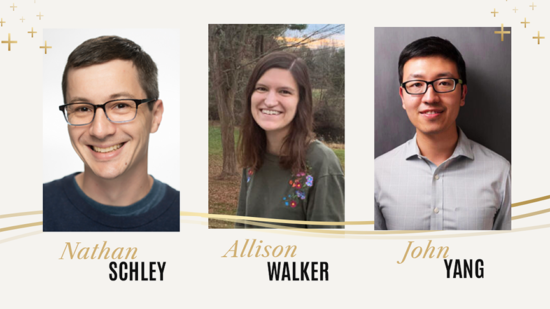Three A&S chemists to research therapeutics, fuel conversion, and enzyme design with NIH MIRA grants

College of Arts and Science faculty members Nathan Schley, Allison Walker, and John Yang have each been awarded grants from the National Institutes of Health to continue their groundbreaking chemistry research. Known as the Maximizing Investigators’ Research Award (MIRA), these grants provide both new and established researchers of general medical sciences with more than $1.9 million each over a five-year period.
All three faculty members are conducting big-picture research with practical applications in a variety of health contexts—including drug synthesis, biomolecular conversion, and disease treatment. The grant funding runs from July 2022 until April 2027, with the express purpose of “providing investigators with greater stability and flexibility, thereby enhancing scientific productivity and the chances for important breakthroughs,” per the NIH.
Nathan Schley, associate professor of chemistry, has been researching organometallic chemistry, or the study of metal-carbon bonds and their practical applications in areas like fuel, solvents, and health. Schley said he plans to use the grant funding to further investigate methods of transforming molecular catalysts.
Schley and his team in the Schley Research Group seek a more cost-effective system of converting compounds found in diesel fuel and some face washes, which will in turn enhance our understanding of these molecular compounds and could ultimately benefit our health.
Meanwhile, Allison Walker, assistant professor of chemistry, applies machine learning to study the synthesis of small molecules known as natural products, which she expects will culminate in the discovery and/or biosynthesis of new organic compounds that can be used to treat various human diseases.
Walker plans to utilize the MIRA grant to continue development of her lab’s machine learning systems, which currently examine large datasets and molecular simulations in the pursuit of therapeutically beneficial compounds. This involves algorithm design, protein research, and even experiments in directed evolution, all of which may result in the discovery of these novel compounds with innovative functions.
Zhongyue (John) Yang, assistant professor of chemistry, is interested in biomolecular design. His group is developing a high-throughput computational ecosystem known as Mutexa, which will eventually realize Yang’s long-term goal of automatic enzyme design. Through integrating Mutexa and experimental tests, Yang’s lab seek to discover new enzymes that will help us recycle polymers, synthesize drugs, and even treat food allergies. His hope is that Mutexa becomes an industry-wide software that makes biomolecular design quick and easy.
Schley, Walker, and Yang’s disparate research interests overlap in a few key ways. All three faculty members are chemistry innovators, bringing new perspectives and fresh research ideas to their field. Additionally, each award recipient’s research has relevant and far-ranging practical applications in the real world, from synthesizing new pharmaceuticals and converting fuel compounds to making enzyme studies more accessible to the general public.
“The funding of three MIRA awards is an incredible accomplishment,” said John McLean, Stevenson Professor of Chemistry and chair of the Department of Chemistry. “The research programs honored with this distinction are so well-deserving. These prestigious awards underscore the vibrant and intellectually engaging research of our faculty for the benefit of society and beyond.”